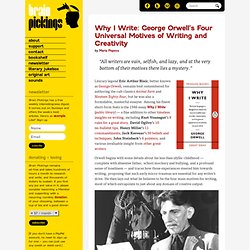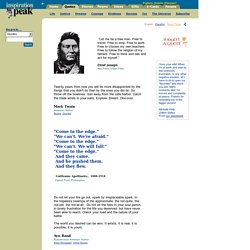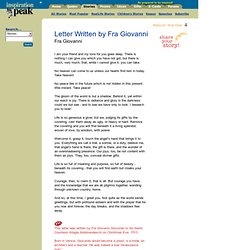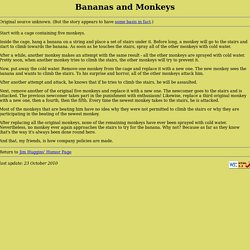

Why I Write: George Orwell’s Four Universal Motives of Writing and Creativity. By Maria Popova “All writers are vain, selfish, and lazy, and at the very bottom of their motives there lies a mystery.”

Literary legend Eric Arthur Blair, better known as George Orwell, remains best remembered for authoring the cult-classics Animal Farm and Nineteen Eighty-Four, but he was also a formidable, masterful essayist. Among his finest short-form feats is the 1946 essay Why I Write (public library) — a fine addition to other timeless insights on writing, including Kurt Vonnegut’s 8 rules for a great story, David Ogilvy’s 10 no-bullshit tips, Henry Miller’s 11 commandments, Jack Kerouac’s 30 beliefs and techniques, John Steinbeck’s 6 pointers, and various invaluable insight from other great writers.
I give all this background information because I do not think one can assess a writer’s motives without knowing something of his early development. Looking back through the last page or two, I see that I have made it appear as though my motives in writing were wholly public-spirited. Dalai Lama's 18 Rules of Living collection by Lotus BioDesign. Inspiration Peak: Quotes about Courage, Faith and Inner Strength.
"Our deepest fear is not that we are inadequate.

Our deepest fear is that we are powerful beyond measure. It is our light not our darkness that frightens us. We ask ourselves 'who am I to be brilliant, gorgeous, talented and fabulous? ' Actually, who are you not to be? You are a child of God. It's not just in some of us; its in everyone. As we are liberated from our own fear, our presence automatically liberates others. " Letter Written by Fra Giovanni. I am your friend and my love for you goes deep.

There is nothing I can give you which you have not got, but there is much, very much, that, while I cannot give it, you can take. No heaven can come to us unless our hearts find rest in today. Take heaven! No peace lies in the future which is not hidden in this present little instant. Take peace! The gloom of the world is but a shadow. Life is so generous a giver, but we, judging its gifts by the covering, cast them away as ugly, or heavy or hard. Welcome it, grasp it, touch the angel's hand that brings it to you. Life is so full of meaning and purpose, so full of beauty - beneath its covering - that you will find earth but cloaks your heaven. Courage, then, to claim it, that is all. And so, at this time, I greet you.
This letter was written by Fra Giovanni Giocondo to his friend, Countess Allagia Aldobrandeschi on Christmas Eve, 1513. Born in Venice, Giocondo would become a priest, a scholar, an architect and a teacher. Bananas and Monkeys. Original source unknown.

(But the story appears to have some basis in fact.) Start with a cage containing five monkeys. Inside the cage, hang a banana on a string and place a set of stairs under it. Before long, a monkey will go to the stairs and start to climb towards the banana. As soon as he touches the stairs, spray all of the other monkeys with cold water. After a while, another monkey makes an attempt with the same result - all the other monkeys are sprayed with cold water.
Now, put away the cold water. After another attempt and attack, he knows that if he tries to climb the stairs, he will be assaulted. Next, remove another of the original five monkeys and replace it with a new one. Most of the monkeys that are beating him have no idea why they were not permitted to climb the stairs or why they are participating in the beating of the newest monkey. After replacing all the original monkeys, none of the remaining monkeys have ever been sprayed with cold water.